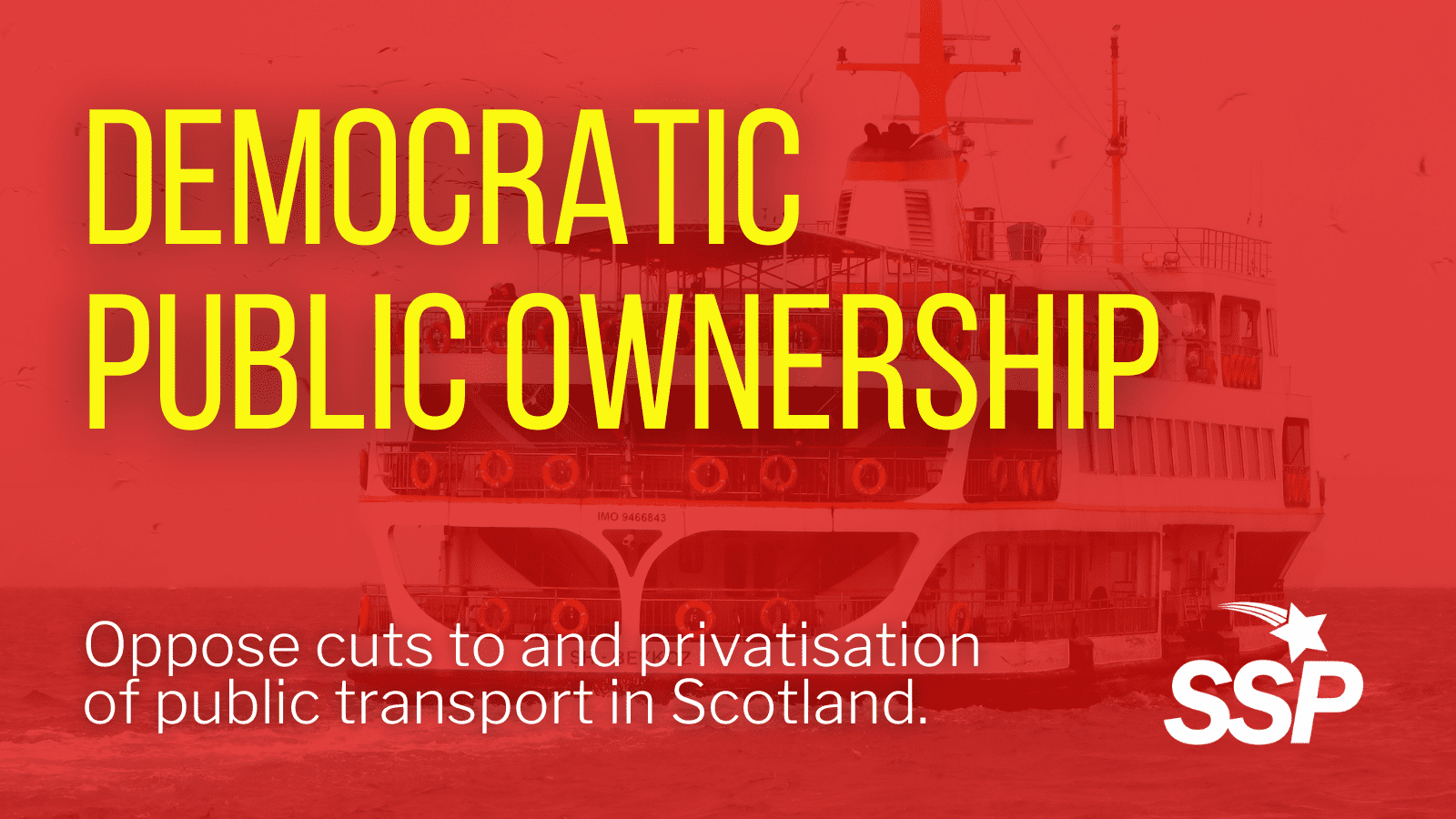
By Richie Venton, SSP Workplace Organiser
The Scottish government not only seems hell-bent on slashing public transport services, but of also giving the whole idea of public ownership a bad name.
As the Dutch state-owned Abellio buggers off over the horizon after drastically failing to provide a reliable ScotRail service, they are out to slash timetables, shut or cut ticket office opening hours, and provoke the wrath of ScotRail workers by resisting inflation-matching pay.
The Scottish government – which in reality has operated train services since March 2020 by pouring tens of millions of public funds into Abellio, through what’s called Coronavirus Emergency Measures Agreements – is poised to take over the running of the trains in April. Of course, this is not proper public ownership: the giant multinationals who own the so-called ROSCOS that provide the rolling stock for ScotRail to run trains will remain in charge, profiteering at the expense of this public transport service.
But rather than demonstrate the advantages of at least partial public ownership the Scottish government – during current TUPE talks with the railway unions over the transfer – are refusing to uphold existing guarantees of no compulsory redundancies; have told the unions they will need to adhere to public sector pay cuts; and have set up not one, but three separate layers of bureaucratic management of ScotRail – with directors on an estimated £2million in combined salaries!
The same Scottish government, comprising not only the SNP but also the Scottish Green Party – are also maintaining a stony silence on the plans to shut three ScotRail ticket offices and drastically reduce the opening hours of all the rest. This butchery would leave more vulnerable people unprotected, in what the RMT’s Gordon Martin has branded “a muggers’ paradise”.
Alongside that – unless massive resistance is built to defeat them – plans are in motion to slash train timetables by 300-a-day; 1,200-a-year.
Giving Public Ownership a Bad Name
These steps highlight the stinking hypocrisy of a Scottish government which desperately sought to bask in a green light during recent COP26 conference, but in real life is prepared to devastate and undermine a railway service with the potential of being a major means of combating pollution, with clean, green public transport. Furthermore, recent fare increases of 4.8% will drive many off the trains, because they’re simply unaffordable.
The real and present danger is that this package of cuts, as ScotRail is taken over by the Scottish government, will aid and abet those who oppose nationalisation and preach the gospel of privatisation.
Privatisation Plans for Ferries
That’s where devastating new revelations of plans for Scotland’s ferry services enter the story.
Scottish government ministers commissioned a report by Ernst and Young for what they’ve dubbed Project Neptune, on the structure of Scottish government-controlled ferry services.
Leaks of this report recommend a break-up of the ferry service, what they euphemistically call “unbundling of routes into smaller packages”. This could and would lead to the most profitable routes being sold off to private firms and – inevitably – less lucrative ones being cut to smithereens.
Similar threats of privatisation were recommended in 2010, but abandoned under public pressure and trade union opposition by Alex Salmond’s government in 2012.
Abject failure to invest in new ferries throughout the period of Scottish devolution – by both Labour/LibDem and subsequent SNP governments – has led to mounting cancellations and failures in ferry services in recent times. This is now being used as cover for privatisation and cutbacks on routes that wouldn’t offer a fortune to profit-crazed privateers.
Labour/LibDem and SNP Failures to Invest
Industry experts agree that the maximum working life of a ferry is 25 years. But 14 of the 33-strong fleet are older than that, and 8 of them were built over 30 years ago. Clapped out ferries lead to cancellations and provide a smokescreen for the siren voices favouring privatisation.
As the RMT’s Gordon Martin rightly said, “Project Neptune is a Scottish government diktat to a private consultancy to look at possibilities and probabilities that includes privatisation. Unbundling is about selling off the profitable routes which means someone will end up with the scraps that don’t make any money. Some of the routes are not profitable in any way, but the whole point is that it is a public service, a lifeline service.”
Where are the gains for island and coastal communities and ferry workers in the much-trumpeted entry into government by the Scottish Greens in such regressive, Thatcherite proposals?
The combined transport unions need to, and undoubtedly will mount a ferocious campaign against these atrocities, and should be supported by every trade unionist, every community relying on public transport, and will certainly have the fullest, active solidarity of the Scottish Socialist Party.
For Democratic Public Ownership
This cocktail of attacks on transport services to the public, and on the workforce who operate those services, does not argue the case for privatisation, but rather for a radically different version of public ownership. One with full democratic control, including by elected union representatives of the workforces, rather than bureaucratic mismanagement by bosses on £350,000 and more.
It further underlines the need from massive state investment in an integrated public transport network – which to be fully effective in combating pollution and global warming, as well as poverty and poor pay, would need to be free at the point of use – as part of a package of free universal basic services.
That is a socialist vision for trains, ferries, buses, subways and trams unique to the Scottish Socialist Party – and certainly not shared but either party in the Scottish coalition government, whose actions speak louder than the words in their election manifestos.
We’ve signed the RMT petition to stop the cuts to ScotRail ticket offices.
You can support that campaign by clicking HERE.
Train operator ScotRail is proposing to reduce the opening hours at 117 ticket offices across Scotland, including closing three ticket offices altogether (Cartsdyke, Clydebank & Woodhall). Nearly all of its ticket offices will be affected by these proposals.
RMT is opposed to these cuts which we believe will worsen passenger service, safety, security and accessibility. RMT is calling on Abellio ScotRail to withdraw its proposals, and for the Scottish Government, which is already managing the franchise under its Emergency Measures Agreement, and will be running it directly in the public sector from 1 April 2022, to scrap the proposed cuts and commit to keeping all of ScotRail’s ticket offices open.
You can support that campaign by clicking HERE.
